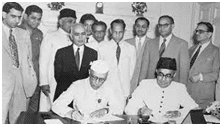Liaquat-Nehru pact
Why was the Nehru-Liaquat pact signed?
- The Nehru-Liaquat Pact, also known as the Delhi Pact, was a bilateral agreement signed between India and Pakistan in order to provide a framework for the treatment of minorities in the two countries.
- It was signed by the two country’s prime ministers, Jawaharlal Nehru and Liaquat Ali Khan.
- The need for such a pact was felt by minorities in both countries following Partition, which was accompanied by massive communal rioting.
- Even in 1950, three years after the Partition was announced, some estimates say that over a million Hindus and Muslims migrated to and from East Pakistan (present day Bangladesh), amidst unspoken violence and communal tensions.
What did India and Pakistan agree upon?
- The Governments of India and Pakistan solemnly agree that each shall ensure, to the minorities throughout its territory, complete equality of citizenship, irrespective of religion, a full sense of security in respect of life, culture, property and personal honour, freedom of movement within each country and freedom of occupation, speech and worship, subject to law and morality,” the text of the Pact begins.
- Members of the minorities shall have equal opportunity with members of the majority community to participate in the public life of their country, to hold political or other office, and to serve in their country’s civil and armed forces. Both Governments declare these rights to be fundamental and undertake to enforce them effectively,”
- It noted that “The Prime Minister of India has drawn attention to the fact that these rights are guaranteed to all minorities in India by its Constitution”, and that “The Prime Minister of Pakistan has pointed out that similar provision exists in the Objectives Resolution adopted by the Constituent Assembly of Pakistan”.
- Also, “Both Governments wish to emphasise that the allegiance and loyalty of the minorities is to the State of which they are citizens, and that it is to the Government of their own State that they should look for the redress of their grievances.”
What was SP Mukherjee’s issue with the Pact?
- Mookerjee had initially been an advocate for a united India, but as Partition became increasingly inevitable, he shifted his focus towards advocating for a divided Bengal, with West Bengal specifically meant for Hindu Bengalis. His subsequent politics continued on these lines.
- Thus, when the Delhi Pact was signed, promising minority rights and the setting up of minority commissions in both India and Pakistan, Mookerjee was incensed. Looking at the huge influx of Hindu refugees from East Pakistan, he felt that the Pact was a betrayal of the logical outcome of the Partition – a Hindu India and a Muslim Pakistan.
- “After nearly 1,000 years Hindus have got a chance to build the edifice of their own free choice. In the land of their birth let us not be short-sighted or make any mistake for which posterity may curse us. Bharat’s destiny lies in modelling her affairs on the truest concerns of Hinduism”, Mookerjee would say later that year, speaking at RSS’s annual gathering.
- He felt that the Pact would essentially leave Hindus in East Bengal at the mercy of the Pakistani state.
- Instead, he argued for a systematic exchange of population and property at the governmental level between East Bengal and the states of Tripura, Assam, West Bengal and Bihar – granting the Hindu minority in East Bengal an opportunity to settle in India while pushing the Muslim minorities in India to East Bengal.
| Practice Question
1. What is Nehru- Liaquat Pact? Why was it opposed? |




